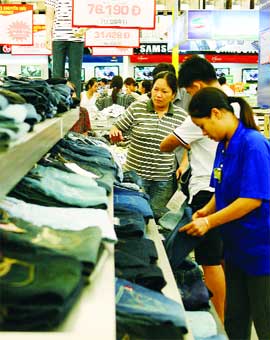INDOCHINA INTERNATIONAL CONSULTING CO., LTD
HO Add: 62L/36 Nguyên Hồng, Ward 11, Bình Thạnh District, HCMC - Vietnam
Biz Office Add: #48 Road No 11, Quarter 6, Hiệp Binh Chánh Ward, Thủ Đức, HCMC - Vietnam
®Source: http://viipip.com should be clearly quoted for any use of information extracted from our website.
Publication permit No: 60/GP-TTĐT , April 05, 2010.


Consumer price index (CPI) slowed down for the second consecutive month, increasing just 0.24 per cent in August against July and 8.31 per cent over the end of last year. The index increased 0.52 per cent on-month in July and 0.55 per cent in June.
However, Hanoi Institute for Socio-Economic Study’s Economic Research Department head Nguyen Minh Phong said the CPI should be tracked further to make sure inflation concerns were eased.
“We need one or two more months to know whether it is going to be a [downward] trend,” said Phong. He said the possible oil price hike in the last months of the year would even increase the pressure on inflation.
Prime Minister Nguyen Tan Dung have also asked the State Bank and the Ministry of Finance to take precautions against high inflation as a sizeable economic stimulus package was is implemented.
The government has adopted a $8 billion stimulus package to boost economic growth, with the bulk of which being pumped into the economy in forms of interest subsidies for bank loans. According to the State Bank, about $22 billion had been disbursed under the interest rate subsidy programme since March 2009.
Meanwhile, the government has planned to disburse $3.5 billion of governmental bonds and about $3 billion of official development assistance this year. Bui Kien Thanh, chairman and chief executive officer of International Asset Management Company, said the amount of money was not small and the question was how effectively it was used.
“We have learned a lesson from ineffective investments in the past that caused high inflation in 2008,” Thanh said. “The problem this time is not how much money we disburse, but how enterprises and people use the subsidised loans,” he said.
Pham Chi Lan, an independent economist, said the money supply in circulation this year was not big enough to push inflation to 2008’s high levels. “This year is different from 2006 and 2007 when we saw huge indirect foreign investments and high credit growth. Now, indirect foreign investments are not flowing into the country so much and annual credit growth has been kept under 30 per cent,” said Lan.
But she agreed that inflation would be a threat to the economy if the stimulus money went in the wrong direction. At a recent meeting of the National Financial Supervisory Council, some members proposed that the government introduce a second short-term interest rate subsidy package as soon as the current package ends in December, sparking new concerns over high inflation due to the additional amount of money injected in circulation.
Le Duc Thuy, chairman of the council, said that a second interest rate subsidy package was essential to help enterprises overcome and recover from the economic slowdown. However, Thuy said high inflation would not necessarily return.
- FDI capital continues to pour into Vietnam (6/11/2025 1:20:33 PM)
- Thanh Hoa receives good news: Preparing to have an additional industrial park of up to 470 hectares, creating jobs for nearly 30,000 people (6/11/2025 1:15:09 PM)
- Industrial Park Real Estate: Waiting for the New Generation of FDI (6/11/2025 1:10:15 PM)
- A wealthy Vietnamese city will have two special economic zones after the merger (6/11/2025 1:04:42 PM)
- 30 billion USD capital FDI in Việt Nam by 2025, a series of "ông big" races to expand the land fund (6/11/2025 12:55:26 PM)
- the 2nd largest city in the North will start construction on an international economic zone (6/11/2025 12:50:20 PM)
- Japanese giant Sumitomo continues to want to build an industrial park in the countrys fourth smallest province. (6/11/2025 12:40:45 PM)
- 3 foreign corporations want to invest billions of dollars in Ba Ria - Vung Tau (6/11/2025 12:34:30 PM)
- Lotte Group member starts construction of nearly 1,000 billion VND logistics center in the province with the most industrial parks in Vietnam (6/11/2025 12:33:26 PM)
- Forming a regional center for manufacturing spare parts and components (6/11/2025 12:24:08 PM)
- Vietnams first wafer factory is about to start construction (6/11/2025 12:19:09 PM)
- Dong Nai attracts foreign investors (6/11/2025 12:13:27 PM)
- Tay Ninhs largest industrial park welcomes a $150 million high-end knitted fabric factory project (6/11/2025 12:11:00 PM)
- (6/11/2025 12:09:10 PM)
- Vietnam will become a destination for Chinese investors in the future (11/6/2023 1:03:19 PM)

- FDI capital continues to pour into Vietnam
- Thanh Hoa receives good news: Preparing to have an additional industrial park of up to 470 hectares, creating jobs for nearly 30,000 people
- Industrial Park Real Estate: Waiting for the New Generation of FDI
- A wealthy Vietnamese city will have two special economic zones after the merger
- 30 billion USD capital FDI in Việt Nam by 2025, a series of "ông big" races to expand the land fund










 ADB: Vietnam’s 2009 GDP growth to be highest in South East Asia
ADB: Vietnam’s 2009 GDP growth to be highest in South East Asia MGM Grand Ho Tram: Vietnam’s First ‘Las Vegas Style’ Integrated Resort
MGM Grand Ho Tram: Vietnam’s First ‘Las Vegas Style’ Integrated Resort Nha Trang’s Twin Towers project licenced
Nha Trang’s Twin Towers project licenced Foreign investors still have good opportunities in Vietnam
Foreign investors still have good opportunities in Vietnam Sierra Wireless gets a foot in Vietnam’s ICT market
Sierra Wireless gets a foot in Vietnam’s ICT market